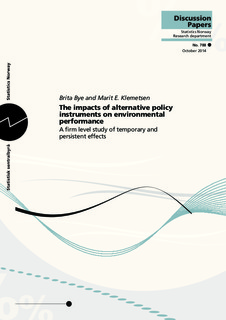The impacts of alternative policy instruments on environmental performance. A firm level study of temporary and persistent effects
Working paper
Published version
Permanent lenke
http://hdl.handle.net/11250/2627686Utgivelsesdato
2014-10Metadata
Vis full innførselSamlinger
- Discussion Papers [1003]
Sammendrag
We study the effects of various environmental regulations on environmental performance measured as emission intensity. Moreover, we aim to test whether any such effects are persistent or only temporary. Conventional theory predicts that indirect regulations as opposed to direct regulations provide continuous dynamic incentives for emission reductions. Our unique Norwegian firm level panel data set allow us to identify effects from different types of regulations such as environmental taxes, non-tradable emission quotas and technology standards. The data includes information of different environmental regulations, all kinds of polluting emissions, and a large number of control variables for all polluting incorporated firms. Empirically we identify positive and significant effects from both direct and indirect policy instruments. We also investigate whether the regulations provide continuous dynamic incentives that lead to persistent effects. In contrast to what the literature suggests, we find evidence that direct regulations promote persistent effects. Indirect regulations will, on the other hand, only have potential persistent effects if environmental taxes are increasing over time.
Utgiver
Statistisk sentralbyråSerie
Discussion papers;788Beslektede innførsler
Viser innførsler beslektet ved tittel, forfatter og emneord.
-
The welfare effects of carbon policies: grandfathered quotas versus differentiated taxes
Bye, Brita; Nyborg, Karine (Discussion Papers;No. 261, Working paper, 1999)Recently, it has been demonstrated that pre-existing distortionary taxes can substantially increase the costs of market-based instruments which do not raise revenue, such as non-auctioned emissions quotas. Revenue-raising ... -
Labour market rigidities and environmental tax reforms : welfare effects of different regimes
Bye, Brita (Discussion Papers;No. 242, Working paper, 1998)The working of the labour market is important for the total welfare effects of tax reforms. This paper analyses, by using a computable general equilibrium model for the Norwegian economy, how different assumptions about ... -
Consequences of the IPPC-directive’s BAT requirements for abatement costs and emissions
Larsson, Jan; Telle, Kjetil (Discussion Papers;No. 411, Working paper, 2005)Abstract: The Integration Pollution and Prevention Control (IPPC) directive from the European Union implies that the regulatory emission caps should be set in accordance with each industry’s Best Available Techniques ...
